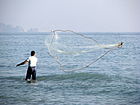 Who are "the afflicted?" If we are to comfort them, we need to be able to identify them. Today we might consider them to be the people of Nepal suffering after the earthquake or the residents of Baltimore who have experienced death, protests and curfews. But, unless we personally know someone involved in those events, we have no opportunity to offer comfort. We might, on the other hand, know someone who has lost a job, had a fire in their home, or been unjustly accused. Sometimes those who are afflicted hide their problem. They don't want anyone to know that they've lost a job, or their spouse has left them, or the insurance has run out for their sick child. So, often, the person whom we have the opportunity to comfort is someone really close to us, a family member or life-long friend. Comfort can be a listening ear, doing the laundry for someone spending their days at the hospital, or taking in people who have lost their home. Years ago when my mother was in her final illness, a neighbor, who knew about insurance, offered to keep track of the doctor and hospital bills. It was a tremendous load off of my mind as my days revolved around my mother's medications, oxygen supplies and doctor appointments. Another friend offered me a room to sleep in when my sister would take care of Mom for a night. These acts of kindness were a big comfort to me. For Reflection: If we listen to people and look around, we may see opportunities to comfort a friend who is afflicted. "What good is it, my brothers, if a man claims to have faith but has no deeds? Can such faith save him? Suppose a brother or sister is without clothes and daily food. If one of you says to him, 'Go, I wish you well; keep warm and well fed,' but does nothing about his physical needs, what good is it? In the same way, faith by itself, if it is not accompanied by action, is dead." (James 2:14-17) Let us pray. Father, for the times when I have turned a blind eye, forgive me. For the times when I have seen the need, but refused to get involved, forgive me. For the times when I have hardened my heart to another's affliction, forgive me.
0 Comments
 Immediately upon his public ministry, Jesus began to perform miracles. Luke gives these accounts in his gospel to show that Jesus is the anointed one of God, the Messiah. Because people had seen him casting out demons and healing people, more and more people gathered to hear him preach. Jesus had already healed Simon's mother-in-law of a high fever, when he sits in Simon's boat to preach to the people on the shore. Following the message, he told Simon to go out into the deeper water to fish. It was not the right time of day to fish and Simon knew it. But he went out anyway because Jesus asked him. They caught so many fish that one boat couldn't handle them all. So James and John bring out their boat to help (Luke 5:1-11). This miraculous catch of fish, mid-morning, convinced Simon(Peter), James and John that Jesus was someone worth listening to. They hadn't asked Jesus to help them with fishing. Although they hadn't caught anything that early morning, and had no doubt missed out on a day's wages, they didn't complain. It seems Jesus arranged that miracle just to impress them. It worked. They began to follow Jesus. For Reflection: Jesus may move in unexpected ways. After all, what does a carpenter know about fishing? Where will I see Jesus working today? If He calls me to do something I've already tried and failed at, will I try one more time? Let us pray. Jesus, you are the master of everything above the earth, on the earth and under the earth. All creation owes its existence to you.  As we grow in maturity in Christ there are things we must "put off" according to Paul. Since Paul is fond of lists, let us list here the things we are to put off: your old self, deceitful desires, falsehood, anger, stealing, unwholesome talk, grieving the Holy Spirit, bitterness, rage, brawling, slander, malice, sexual immorality, impurity, greed, obscenity, foolish talk, coarse joking, darkness, drunkenness (Ephesians 4:17 - 5:20). Paul gives, of course, another list of what we are to "put on": our new self, righteousness, holiness, truth, wholesome talk (psalms, hymns and spiritual songs), kindness, goodness, compassion, forgiveness, love, thanksgiving, light, understanding, the Spirit. Many of these have to do with our words, what we say to one another. As James says in his letter, if we control the tongue we control the entire person (James 3:1-12). If we change the way we speak, we will change the way we act. For Reflection: If we don't find ourselves more in the second list from Ephesians than the first, can we find a way to immerse ourselves in psalms, hymns and spiritual songs? Let us pray. I proclaim righteousness in the great assembly. . . . I do not hide your righteousness in my heart; I speak of your faithfulness and salvation. I do not conceal your love and your truth . . . . (Psalm 40: 9-10).  Following God is seldom easy. We can look to the record of the prophets in the Old Testament and Jesus' closest disciples in the New Testament. Only John seems to have died of old age. Following God's directives, doing what Jesus told them to do, got them killed. It is the same today in many places in the world. Sometimes those who follow Jesus do, or want to do, the wrong thing. When Peter cut off the ear of the servant of one of the men who had come to arrest Jesus, Jesus healed the man's ear. Even in a time of high stress, Jesus showed compassion and offered healing. Another time Jesus had to rebuke James and John. When they had been refused hospitality in a Samaritan village (another case of no room in the inn?), they asked Jesus, "Do you want us to call down fire from heaven to consume them?" (Luke 9:54) Calling down fire from heaven seems like an extreme response to a small rejection, and certainly Jesus tells them they are out of order. But what else does that question indicate to us? That they believed they had the power to call down fire from heaven. For reflection: Jesus never called down fire from heaven, as far as we know. What made James and John think this was possible and appropriate? Is there a time when this might be appropriate? Let us pray. Lord of Justice, Lord of Mercy. You who want all people to be saved and none to be lost, help us to curb our baser instincts and listen to your guiding wisdom. Help us to know how to use the power that you give us to increase your Kingdom on earth.  As another area needing forgiveness let's look at a bad case of sibling rivalry. The story of Joseph and his brothers from Genesis 37 - 50 is one of the most well known in the Bible. It begins with Joseph's 10 older brothers being jealous of him because "Dad liked him best". There is plenty of blame to go around in this story, and plenty of repentance and forgiveness needed. First, the boys' dad, Jacob, should not have shown preference among his sons. Yet he did it so blatantly that they all recognized it (Genesis 37:3-4). So Jacob, head of the family, is the instigator and definitely at fault. Jacob should have repented and asked his sons' forgiveness. Second, the older brothers got fed up with the favoritism. Instead of confronting their father about it though, they took it out on Joseph. Third, Joseph should not have been flaunting his pride of place in front of his brothers, even if he was younger and less responsible than they. For Reflection: Let's concentrate on Jacob's role today. Is there any place in my life where I have shown favoritism when I should not have? At home? At work? Why am I showing favoritism? (Read James 2:1-13) Let us pray. Father, thank you for revealing to me where I am showing favoritism. I repent of that and I ask your help in correcting my attitude and my feelings. I ask your forgiveness for treating others unfairly. Please help me to treat them the way you want me to treat them.  Lately I realize more and more the truth of Paul's statement to the Ephesians that "our struggle is not against flesh and blood, but against the rulers, against the authorities, against the powers of this dark world and against the spiritual forces of evil in the heavenly realms" (Eph 6:12). And as James says, "What causes fights and quarrels among you? Don't they come from your desires that battle within you? You want something but don't get it. You kill and covet, but you cannot have what you want. You quarrel and fight" (James 4:1-2). If our enemy is not a flesh-and-blood person, then killing that person is not the answer. Killing and war are not the solutions that so many people think they are. As Christians we must take the battle where it belongs. It is a spiritual battle of good against evil, of control over the minds and hearts of people, because a person devoted to God seeks peace not war and death. Whether the battle is between nations or just two people, as Christians we must identify the real enemy and engage the battle there. For reflection: Am I able to identify the true enemy facing me? Facing my family? Facing my country? Let us pray. Father, I ask for discernment in identifying the true identity of the enemy facing me. And I ask for the spiritual weapons I need to defeat that enemy. I also need greater love for the people who appear to be my enemies. Help me to see them as you see them. |
AliceI started this website and blog on May 1, 2012. I am a Catholic who has been in ministry for many years. I first developed what I would call a close relationship with Jesus in the early 1970s. Ever since then I have been praying with people for healing and other needs. It is because I have seen so many of these prayers answered that I am so bold as to offer to pray for you individually through this website and phone line. Archives
July 2021
Categories
All
|
Proudly powered by Weebly

 RSS Feed
RSS Feed